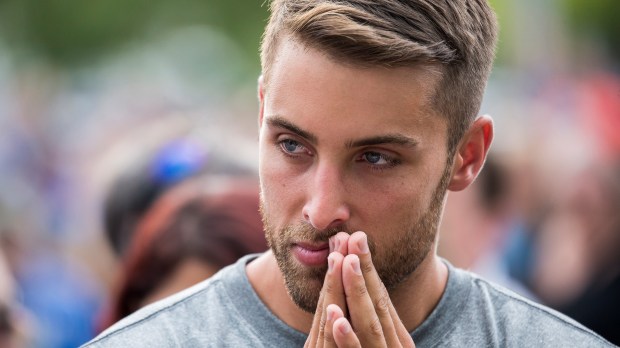“And why not people who have had abortions, while we’re at it? In fact, anyone who has ever done anything the Bible says is wrong. We could set up a booth. ‘Apologies here. We don’t know what we were thinking.’” Thus a Protestant friend, riffing on Pope Francis’s comment that Christians should apologize to homosexual people for the way Christians have treated them.
My friend is vexed by Francis. He was especially annoyed because, as he put it later in the conversation, “I suppose I resent the suggestion that all Christians hate gays and have hurt gays, full stop.” Another friend, a Catholic, responded that the pope’s remark “comes at a bad time, on the heels of the Orlando shooting. . . . I see no reason to drag Christianity into the fray at this point because of the optics surrounding Orlando.”
Seen on Facebook were starker responses to Francis’s words, some of them perfectly understandable, to the effect that the writer wasn’t going to apologize to homosexual people because they should apologize to him or to Christians in general. Anyone who’s taken a public role in defending marriage will have some experience of abuse ranging from contemptuous moral patronizing to a weird mixture of hysteria and thuggery. Some who have quietly and inoffensively been living and letting live have been persecuted through the courts and the state, and the media, for acting on their principles. America has people willing to destroy someone’s livelihood because they won’t bake a cake a couple could get a few blocks away.
There is no excuse for that. None. It’s an act of theft and detraction. It’s the work of bullies.
More to read:translating the pope’s remarks on apologizing to gay community
As Catholics we’re stuck
But. As Catholics we’re stuck with the Dominical instruction to turn the other cheek, to bless those who curse us, to pray for those who abuse us, and even to let someone keep what he stole from us. Jesus insists on this: “Be merciful, then, as your Father is merciful,” he says. “Judge nobody, and you will not be judged; condemn nobody, and you will not be condemned. . . . The measure you award to others is the measure that will be awarded to you.”
Jesus doesn’t seem to care what offense the other people may have given us. He does not ask us to consider the political “optics.” His instructions do not depend on a balance of offenses. He doesn’t mention what the other guy did. It doesn’t matter what he did.
Take the hit, bless and pray for the guy, let him have what he wants, be merciful, judge not. That’s what Jesus wants, and I think that’s all Francis was saying when he told us to ask our homosexual friends’ (and several other groups’) forgiveness for not having treated them as we, as Catholics, should have treated them. He didn’t say it all that clearly, but that’s what he asked of us.
It’s not to say that the persecuted should just give in. We can exercise our legal rights, as St. Paul did when he demanded a trial in Rome. How exactly to draw the distinction I don’t know, but one can turn the other cheek and still file a legal defense. And bless and pray etc. for the persecutor.
Jesus instructs us to do something radical and very difficult. I am not big on turning the other cheek, even in web arguments with strangers. I want to win. Worse, I want them to lose. Of all Jesus’ instructions, this is the one I find hardest and most annoying, and I’m sure I’m not alone.
But fair is fair
But fair is fair. It’s what we ask of others, this radical uncomfortable obedience.
We ask our homosexual brethren, and our divorced brethren without annulments, to deny themselves something almost everyone else can have: a marriage, two people forming a haven in a heartless world, with someone they actively desire, with all the pleasures of romance that sexual desire brings. We ask them to live as celibates in a sexually-sodden culture where they may never find the alternative of deep, committed friendships. We ask them to risk loneliness we don’t risk.
The least we can do is turn the other cheek when an online antagonist says stupid or vicious things about us, to bless him and pray for him, to avoid judging him, to show him mercy — and perhaps, if we can in a way he will hear, to gently admonish. To treat him, to put it in a nutshell, as we would like to be treated. The least we can do is apologize to those we haven’t loved as we should, and heaven knows that list can be very long.
Doing it becomes slightly easier knowing that in doing so we participate in the Christian hope. After telling us not to judge nor condemn, Jesus says, “Forgive, and you will be forgiven. Give, and gifts will be yours.” Not a bad payoff just for being kind.
More to read:You’re acting like a jerk, but…”
[Editor’s Note: Take the Poll – Do you think an apology shows weakness?]

